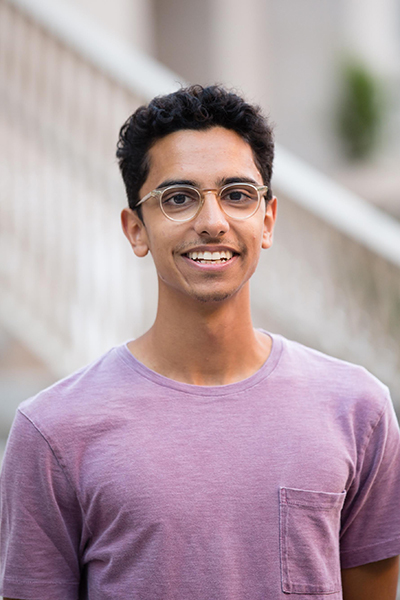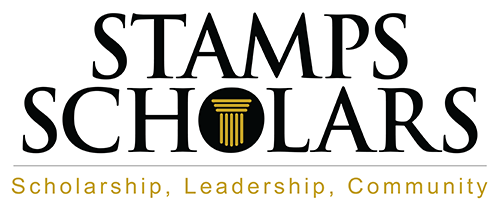Exploring the World through Words
By Hannah Steinkopf-Frank
 University of Southern California (USC) Stamps Scholar Cyrus Khandalavala is interested in exploring the terrain of political, ethical, and cultural thought around the world. He strives, without expecting definite conclusions, to understand how people from everywhere share and create beliefs about this world, about themselves, and about the people around them.
University of Southern California (USC) Stamps Scholar Cyrus Khandalavala is interested in exploring the terrain of political, ethical, and cultural thought around the world. He strives, without expecting definite conclusions, to understand how people from everywhere share and create beliefs about this world, about themselves, and about the people around them.
Khandalavala grew up in Omaha, Nebraska. His interest in international issues began with his parents, who are doctors originally from India. He attended Westside High School, following his two older brothers. “My last name, which is distinctive, had quite a reputation.”
He discovered political economics during his sophomore year when he took an economics class “totally out of my range.”
“As I got more into it, I realized that all of this mathematical modeling is kind of far away from the way things are, and if you really want to look at the way it is, you have to look at the political system as well.”
In his free time, he enjoyed exploring nature as a Boy Scout and running track and cross-country. He also pursued creative hobbies, playing piano and participating in show choir.
He enjoyed performing because “usually, it’s a high wall to get over because it’s not the same as just having the skill: saying I’m a good singer or I can play the piano well. But we’re also out there sharing it, demonstrating it, showing that you can play all the right notes but also that something in your performance is about you and you crafting it and delivering it to other people.”
He was drawn to USC because of the large size of the school and the diversity of opportunities available to him. His majors are comparative literature and international relations and global economics with a focus in Latin American economic development.
His academic interests continue outside of the classroom through Glimpse From the Globe, an international relations-focused student publication. He wrote about German politics and the U.S.-China relationship and is currently researching regional politics in India. He is also working with the U.S.-China Institute reporting on Chinese investment in infrastructure projects and mineral mines in Latin America.
He said talking directly with experts and those experiencing these issues firsthand is “fascinating because most of the writing I’ve done is based on online research.”
He is also the treasurer of the Sigma Alpha Mu fraternity, which has “taught me a lot about how to keep a large group of people accountable and manage a lot of simultaneous decisions.”
In addition, he is involved with Scholars Leading Scholars, a mentorship group that pairs high school juniors with college students who advise them on how to stay on top of the college admittance process. While this includes test prep, Khandalavala also helps students craft engaging projects and compelling essays.
“The number one place where these students struggle is with the personal statements, so we thought this would be good exercise. We had the kids choose something they felt was important about themselves and had them create their own creative projects and present them to a group at school.”
The summer after his freshman year, he traveled to Taipei, Taiwan through a USC program to intern at a government-funded technology startup incubator. His boss was blind and was developing accessibility technology for people with hearing and vision impairments.
“I never would have guessed the number of things you actually have to take into consideration when you’re developing these technologies, just the number of challenges that people face and simple tasks that become very difficult. All of it was about giving people back their independence.”
This past summer, he took a USC course in New York on the contemporary art industry, exploring how pieces gain financial value and how criticism functions. Next, through an Oxford University program in Geneva, he studied the refugee influx and the coinciding political crisis. He also traveled to Northern Greece, where he worked in refugee camps and community resource centers.
“It was interesting for me to see from a wider angle how migration has become the one factor of production that, as the economy has globalized, has actually become more restricted — it’s more difficult to move around the world now than it was 100 years ago.”
He added that the group was “trying to understand what we can do, how the system is failing, how you try to help people who are coming while also trying to figure out how do we stem this flow driven by conflicts that have deep histories far away.”
He ended his summer traveling to India to visit his grandmother, who he had not seen in 10 years. He found it interesting to see how development was occurring in a country where most people have cell phones, but there’s no strong industrial infrastructure.
For the rest of his time in college, he is excited to continue building Scholars Leading Scholars and growing as a writer in defining his voice. In his free time, he enjoys reading and watching movies. He also still performs, but now as a hip-hop dancer and standup comedian.
“You’re doing philosophy up there. You’re doing poetry up there. It’s totally a performance about slipping into the truth, but you’re not arguing something. You’re making people laugh.”
Although he does not have a clear career goal in mind, he wants “to be in a place where I have the freedom to follow my own intentions and intuitions and have a platform to communicate with people and to express myself but also to be engaged in a dialogue.”
